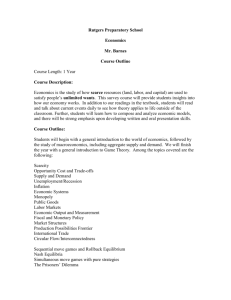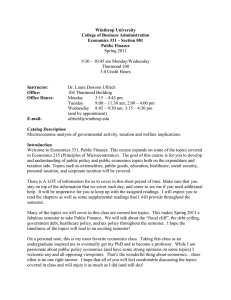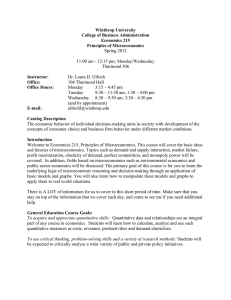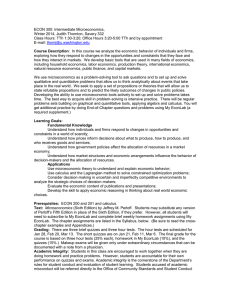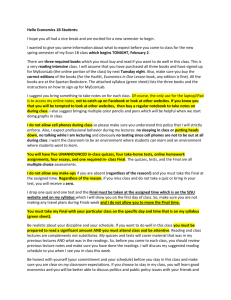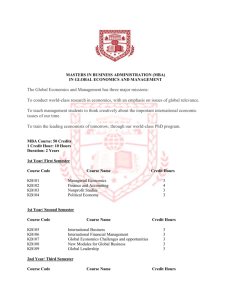Winthrop University College of Business Administration Economics 343 – Section 001 Environmental Economics
advertisement
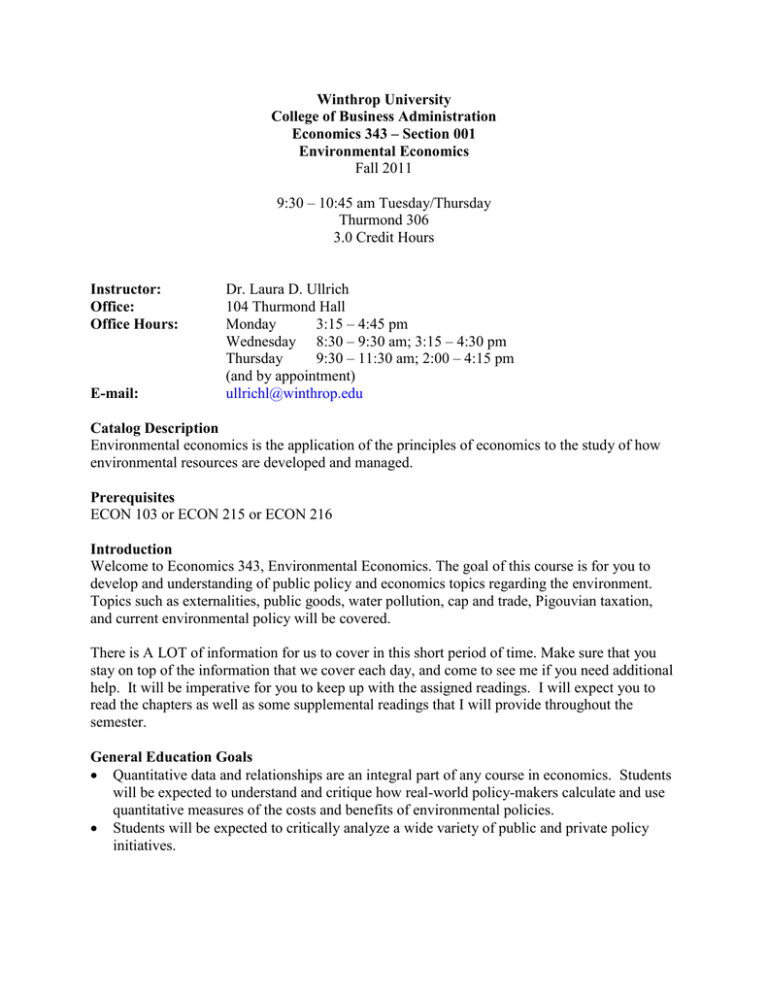
Winthrop University College of Business Administration Economics 343 – Section 001 Environmental Economics Fall 2011 9:30 – 10:45 am Tuesday/Thursday Thurmond 306 3.0 Credit Hours Instructor: Office: Office Hours: E-mail: Dr. Laura D. Ullrich 104 Thurmond Hall Monday 3:15 – 4:45 pm Wednesday 8:30 – 9:30 am; 3:15 – 4:30 pm Thursday 9:30 – 11:30 am; 2:00 – 4:15 pm (and by appointment) ullrichl@winthrop.edu Catalog Description Environmental economics is the application of the principles of economics to the study of how environmental resources are developed and managed. Prerequisites ECON 103 or ECON 215 or ECON 216 Introduction Welcome to Economics 343, Environmental Economics. The goal of this course is for you to develop and understanding of public policy and economics topics regarding the environment. Topics such as externalities, public goods, water pollution, cap and trade, Pigouvian taxation, and current environmental policy will be covered. There is A LOT of information for us to cover in this short period of time. Make sure that you stay on top of the information that we cover each day, and come to see me if you need additional help. It will be imperative for you to keep up with the assigned readings. I will expect you to read the chapters as well as some supplemental readings that I will provide throughout the semester. General Education Goals Quantitative data and relationships are an integral part of any course in economics. Students will be expected to understand and critique how real-world policy-makers calculate and use quantitative measures of the costs and benefits of environmental policies. Students will be expected to critically analyze a wide variety of public and private policy initiatives. Social and cultural conflict often originates with the disparate and competing goals of economic actors. Students will learn to appreciate how efficient economic policies can resolve these conflicts in a way that maximizes overall social value. The course covers such critical current issues as pollution, climate change, resource depletion, overpopulation, poverty and sustainable growth. Disability Services Winthrop University is dedicated to providing access to education. If you have a disability and require specific accommodations to complete this course, contact the Office of Disability Services (ODS) at 323-3290. Once you have your official notice of accommodations from the Office of Disability Services, please inform me as early as possible in the semester. Once you have your Professor Notification Form, please tell me so that I am aware of your accommodations well before the first assignment, test, or paper. Student Conduct As noted in the Student Conduct Code: “Responsibility for good conduct rests with students as adult individuals.” The policy on student academic misconduct is outlined in the Student Conduct Code Academic Misconduct Policy in the Student Handbook, which can be found online at http://www3.winthrop.edu/studentaffairs/handbook/StudentHandbook.pdf Academic Dishonesty Academic dishonesty is a serious offense because it diminishes the quality of scholarship and the learning experience for everyone on campus. An act of academic dishonesty may lead to such penalties as reduction of grade, probation, suspension, or expulsion from the University. I reserve the right to assign a grade of zero for actions involving violations of Winthrop’s Student Academic Misconduct Policy. Technology Policy Cell phones or related devices are not allowed at any time during class. Text messaging in class is strictly prohibited. You will be asked to leave class and will be counted absent if you are texting while class is in session or if your phone rings repeatedly. Students are permitted to use a calculator during tests when needed, but it must be a basic calculator without storage functions (e.g. a dollar store calculator). Any student who is caught using an electronic device such as a cell phone, PDA, Blackberry, iPod, etc. during an exam will be subject to academic dishonesty prosecution. Required Texts Environmental Economics and Policy, 6th Edition, Tom Tietenberg and Lynne Lewis, 2009. Tests There will be three tests given in this class. There will be no comprehensive final exam. The third test will be administered during the final exam period. Exam 3 will be over a larger amount o material, so it will count slightly more than exams 1 and 2.. The tests will consist of true/false and short answer questions, and will be given during the class period. NO MAKEUP TESTS WILL BE GIVEN. If a legitimate issue arises and you must miss an exam, you will be allowed to shift that portion of your grade to the final exam only if I am notified of the issue at least one day prior to the test. In other words, if we have a test on Tuesday, I must receive an e-mail from you by 5:00 pm on Monday stating the reason for your absence. Otherwise you will receive a zero for that test. You may only be excused from a test under special circumstances (i.e., death in the family or severe illness). Not being able to get a ride to class or going to the beach for a long weekend are not acceptable excuses. Tentative Exam Dates: September 14th, October 12th, December 12th 8:00am The following things are not allowed during examinations in this course: Use of technological devices (see previous policy) Using the restroom. The class is only 75 minutes long, so you shouldn’t have any problems. Make sure you go right before class! Talking to your classmates Sleeping Book Study You will participate in a book study this semester which will involve reading a book off of the list I will provide and writing a short paper (around 8-10 pages). ALL PAPERS ARE DUE ON DECEMBER 1ST. Further instruction on the project will take place in a couple of weeks after we get settled into the class. You must notify me of what book you are reading NO LATER THAN SEPTEMBER 20th. Reading Quizzes I will provide some supplemental readings on the topics throughout the semester. You will be assigned readings a week in advance. A short quiz will be given on the date the reading is due to ensure that you have read the material. Reading the book will help you understand the material at a much higher level as it is written in a very readable manor. I think we will all benefit from the readings and they will lead to much better in-class discussion. We will have a minimum of four quizzes this semester, and you will be able to drop your lowest quiz grade. No makeup quizzes will be given. Attendance I expect you to attend class. Period. Attending class is the only way that you will do well in this class as I do not teach directly from the book and often bring in outside material/examples. I will take attendance at the beginning of every class. Attending class will also be important because of the occasional quizzes. If you are absent you will need to obtain notes from a fellow classmate; I will not be able to provide you with notes. The Winthrop University attendance policy states that any student missing more than 25% of the class meetings will receive an F in that class. Therefore, if you miss more than 8 class periods during the semester you will receive an automatic F in the class regardless of performance on tests and quizzes. Grading Exam 1 Exam 2 Exam 3 Project Reading Quizzes 20% 20% 35% 20% 5% Grading Scale 90 - 100 A 80 – 90 B 70 – 80 C 60 – 70 D <60 F Anticipated Course Outline Chapter 1: Chapter 2: Chapter 3: Chapter 4: Visions of the Future Valuing the Environment: Concepts Valuing the Environment: Methods Property Rights, Externalities and Environmental Problems EXAM 1 Chapter 5: Chapter 6: Chapter 7: Chapter 8: Chapter 9: Sustainable Development: Defining the Concept The Population Problem Natural Resource Economics: An Overview Energy Water EXAM 2 Chapter 10: Chapter 13: Chapter 14: Chapter 15: Chapter 16: Chapter 18: Chapter 20: Chapter 21: Chapter 11: Land Common-Pool Resources: Fisheries and Other Commercially Valuable Species Environmental Economics: An Overview Stationary-Source Local and Regional Air Pollution Climate Change Water Pollution Development, Poverty and the Environment The Quest for Sustainable Development Agriculture EXAM 3 Important Dates of Note: Last day for S/U registration: September 6 Course withdrawal deadline: October 21
